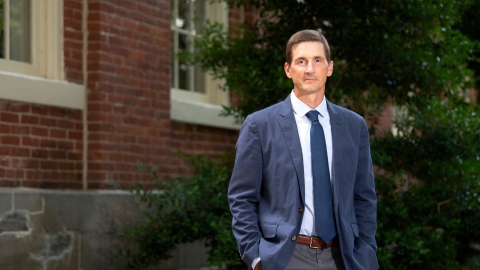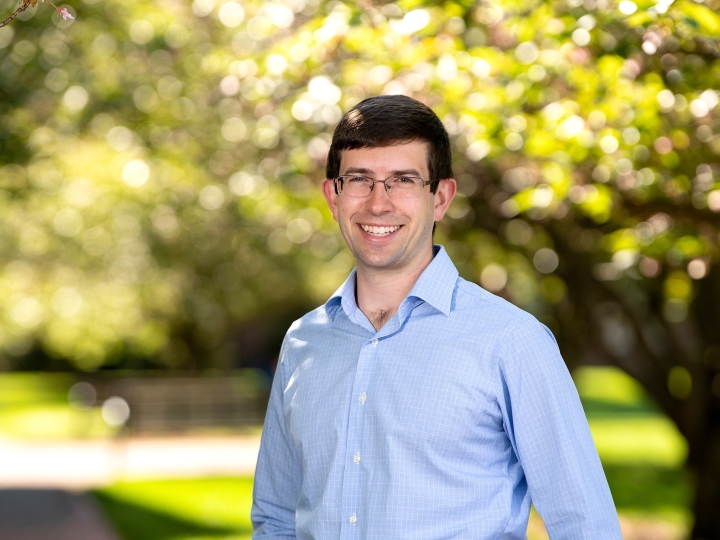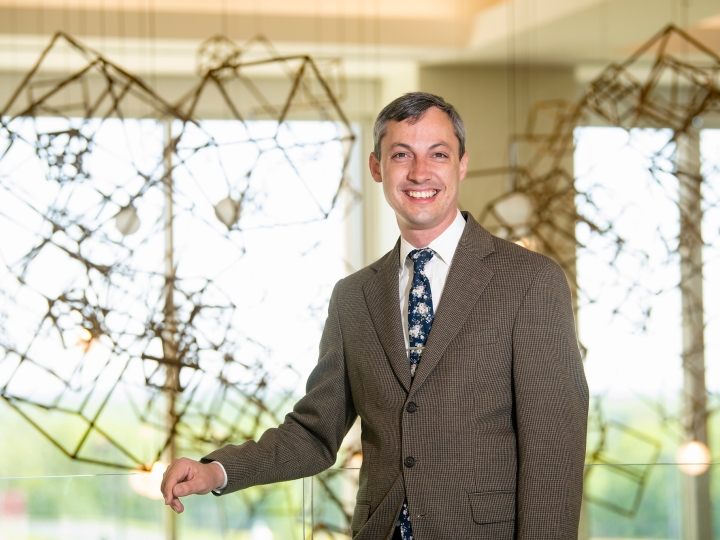
Matt Bailey, Analytics & Operations Management
February 24, 2021
Professor Matt Bailey, the Christian R. Lindback Chair in Business Administration, uses analytics and mathematical modeling to help small organizations solve thorny problems. Photo by Emily Paine, Communications
"It makes me feel good to help people who are doing good things. I can't be an autism tutor. I can't be a clinician who's curing disease. But I can make the lives of people who are doing that work better."
The questions seemed orders of magnitude apart.
On one hand was a multibillion-dollar ride-sharing company seeking better ways to dispatch orders among a half-billion riders and tens of millions of drivers. On the other was Professor Matt Bailey, analytics & operations management, working with a Bucknell colleague to help a lone educational administrator do his job more efficiently, to the benefit of around 100 students with special needs.
Yet when the Institute for Operations Research and the Management Sciences named finalists for its 2020 prize for excellence in practice, there was Bailey, standing side by side with researchers from DiDi Chuxing, China's answer to Uber. It was an acknowledgment that the challenges confronting smaller organizations can be every bit as thorny as those the giants face, if not more so due to tighter budget and resource constraints.
It's also those organizations that Bailey seeks out because they often need his help the most. Bailey, the Christian R. Lindback Chair in Business Administration, uses his skills in analytics and mathematical modeling to help these groups solve problems related to scheduling and resource management.
Corporate conglomerates like DiDi already have the capability to handle these challenges in-house, he says, while for the smallest organizations, they seldom rise to the scale of a major issue.
"But there are in-between organizations that are dealing with these problems day to day. They don't have the expertise, the financial resources or the time to work on them — but the work still has to get done," Bailey says. "If I can make the lives of people who are doing that work better, and allow them to have more time to spend on the things that they're good at, then that gives me value."
In the case of his award-nominated work, which was a collaboration with Bucknell mathematics professor Lucas Waddell, Bailey helped the administrator at an educational nonprofit in Massachusetts coordinate one-to-one tutoring for students with conditions like autism, using tools like Excel rather than more expensive solutions to accommodate a tight budget.
"Students with autism can be very particular about who they're with and how long they spend with certain people, and of course there were the tutors' needs to think about — we had to fit in lunches, and some had obligations at certain times of the day," Bailey explains. "On the surface, it was just an allocation problem, but it had enough rules and constraints that it became a person's entire job. They were spending eight to 10 hours a day figuring out the next day's schedule."
Through automation, Bailey helped the district shrink that task to around 15 minutes per day, opening up the administrator's time to focus on training tutors and developing new initiatives to better serve students.
It's a process he's repeated again and again to aid groups large and small in diverse fields, from a regional hospital to a high school track team looking to strategically match its athletes against the competition.
In a previous project with Geisinger Medical Center in Danville, Pa., Bailey helped build a computer simulation to model patient arrival patterns and transfer rates to make treatment more efficient.
More recently, he's helped Champions Place, a shared living community near Atlanta for young adults with physical disabilities that was founded by Rick '79 and Nancy Murphy Thompson '79, P'08, and supported by a list of more than 40 Bucknell alumni. Bailey worked with organization staff to gather and analyze the residents' care needs to better understand and create more efficient and cost-effective caregiver schedules.
Projects like these provide rich opportunities for Bailey's students to apply the analytics and social entrepreneurship skills they're learning for the greater good — including a group of students who aided the Champions Place initiative.
These opportunities, as well as Bailey's efforts to connect his teaching with his students' own passions, were a big reason he was named one of the Top 50 Undergraduate Professors of 2020 by Poets&Quants, a leading news website dedicated to the coverage of undergraduate business education.
"I've always enjoyed the challenge and satisfaction of solving problems," he told the publication. "Teaching at a business school allows me to work with students and organizations to pursue that passion."

